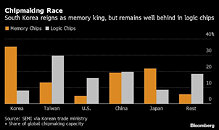- Joined
- Oct 9, 2007
- Messages
- 47,194 (7.56/day)
- Location
- Hyderabad, India
| System Name | RBMK-1000 |
|---|---|
| Processor | AMD Ryzen 7 5700G |
| Motherboard | ASUS ROG Strix B450-E Gaming |
| Cooling | DeepCool Gammax L240 V2 |
| Memory | 2x 8GB G.Skill Sniper X |
| Video Card(s) | Palit GeForce RTX 2080 SUPER GameRock |
| Storage | Western Digital Black NVMe 512GB |
| Display(s) | BenQ 1440p 60 Hz 27-inch |
| Case | Corsair Carbide 100R |
| Audio Device(s) | ASUS SupremeFX S1220A |
| Power Supply | Cooler Master MWE Gold 650W |
| Mouse | ASUS ROG Strix Impact |
| Keyboard | Gamdias Hermes E2 |
| Software | Windows 11 Pro |
The South Korean government, along with 153 Korean companies, has unveiled an ambitious plan to invest USD $450 billion over the next decade, to make its semiconductor manufacturing industry globally competitive, as China and the U.S. are executing similar national plans of their own, which threaten to blunt South Korea's competitiveness in the industry. Leading the effort will be Samsung Electronics and SK Hynix.
Samsung will be spending over $151 billion through 2030 in expanding its manufacturing facilities, while SK Hynix will spend $97 billion to expand its existing facilities; in addition to $106 billion planned to build four new fabs in the Yongin. Both Samsung and SK Hynix are predominantly memory companies, manufacturing DRAM and NAND flash products. This means that while Korea is globally competitive in semiconductor manufacturing overall, it is relying mainly on memory dies, and not logic dies (chips such as ASICs, CPUs, GPUs, SoCs, FPGAs, etc). The two could put in efforts to change this, so their foundry capacity attracts fabless logic IC companies away from Taiwan's TSMC, which specializes in logic over memory.

View at TechPowerUp Main Site
Samsung will be spending over $151 billion through 2030 in expanding its manufacturing facilities, while SK Hynix will spend $97 billion to expand its existing facilities; in addition to $106 billion planned to build four new fabs in the Yongin. Both Samsung and SK Hynix are predominantly memory companies, manufacturing DRAM and NAND flash products. This means that while Korea is globally competitive in semiconductor manufacturing overall, it is relying mainly on memory dies, and not logic dies (chips such as ASICs, CPUs, GPUs, SoCs, FPGAs, etc). The two could put in efforts to change this, so their foundry capacity attracts fabless logic IC companies away from Taiwan's TSMC, which specializes in logic over memory.

View at TechPowerUp Main Site





